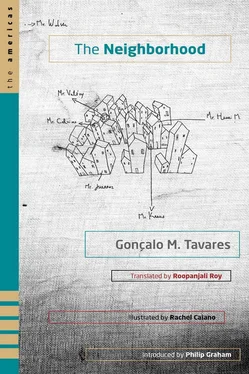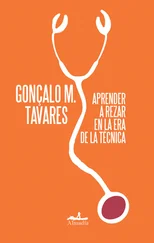But since the Boss absentmindedly put the map in his pocket, by the afternoon he was already using it to blow his nose.
“This damn handkerchief they gave me!” he protested. “It’ll break my nose!”
The two Assistants, who were very patriotic when there were witnesses — and in this case each was a witness for the other — were freezing, all along their spines, from head to toe: that just wasn’t done. Neither gloves, nor an overcoat or a scarf could stop the shivers. Apart from which, it was a few degrees below zero.
“Oh, Boss. That is not a handkerchief: it’s a map of the country!”
“Ah!” exclaimed the Boss, “that’s why it’s so rough!”
The Boss protested, shrugged his shoulders, and, since the damage had already been done, continued to blow his nose with the map.
“Blow your nose along the coast,” suggested one of the Assistants. “It’s the best way to avoid hurting your nose. It’s softer.”
The Boss suddenly stopped and fixed his gaze on his Assistant. The atmosphere was somehow moving: such touching concern for his health. Without a word, the Boss leaned over and planted a small but significant kiss on his dedicated Assistant’s head.
“I have already begun to read your chronicles, Mister Kraus. It’s a pleasant world, isn’t it?”
Mister Kraus smiled. Thanked him. Said his farewells.
The Boss Who Liked Movement

1
The Boss liked change because he did not like to stand still. And he did not like to stand still because he liked change. These were his views about the subject. The Boss had other views, but about other questions. About standing still and moving, these were his views. Two views.
He tried to alternate them. He was sometimes proud of one of them, and was sometimes proud of the other. The Boss would say, “This is called the commutative property of language. Just as two plus three is equal to three plus two, not liking being still is equal to liking movement. And furthermore: liking movement is equal to not liking being still. I don’t know if you understood me?”
The two Assistants had understood.
“So,” said the Boss, pointing to one of them, “you!”
“Me?!”
“Yes, you!”
“What did I do?”
“Nothing. That’s the problem. We need to do things. We can’t stand still. Have I already explained the question of the commutative property to you?”
“Yes, Boss. We really like it! It’s five; three, plus two, it’s five.”
“By the looks of it you didn’t understand. The results don’t matter. What’s important is the movement. Understood?”
The Boss’s two Assistants understood. For the second time.
“Very well. Now, the two of you, while remaining seated, will stamp your feet on the floor, many times, until I order you to stop. Don’t stop until the elections!”
“What a good idea, Boss.”
2
While remaining seated, the two Assistants had been stamping their feet on the ground for several days now. The soles of their shoes had slowly disappeared and, inside their socks, whose material had practically evaporated, their feet burned, as though they were close to a fire. Both of them already had various wounds on their feet. However, the broad smile on the faces of the two Assistants had never flagged for an instant. “Movement was necessary, movement!” the Boss had said. Until the elections.
“Halt!” suddenly shouted the Boss, raising his arm. “I just remembered that we can do a movement that implies a change in space.”
The two Assistants were amazed, their jaws dropped.
“With a change of space!”
“Space, how?”
“Oh, Boss, but couldn’t …”
“… that be rather … hasty?”
“Our adversaries aren’t expecting a sudden rupture,” said the Boss. “Every once in a while we have to completely change our objectives and our plan of action.”
“But it’s four o’clock in the afternoon.”
“It’s time to get up.”
“Excellent idea, Boss.”
“Very well.”
“This is what I thought. Tell me what you think of my solution. The two of you will swap chairs,” continued the Boss. “Mister Assistant will go to Mister Assistant’s chair. And Mister Assistant will go to Mister Assistant’s chair.”
“Boss, I didn’t exactly understand how …”
“Neither did I,” murmured the other.
“To explain it better. Mister Assistant on my right will go to the chair of Mister Assistant on my left. And Mister Assistant on my left will go to the chair of Mister Assistant on my right. At the same time.”
“At the same time?”
“Yes, and vice versa.”
“Vice versa?”
“Exactly. Then you stay in the new chair for an hour, an hour and a half …”
“Very well.”
“… always stamping your feet on the ground …”
“Our feet …”
“… and then: vice versa again.”
“What do you mean by vice versa again, Boss?”
“You change places again.”
“There are only two chairs, Boss.”
“Vice versa twice,” asked the other Assistant, in a murmur, “isn’t that the same as everything being exactly as it was before?”
“No, because it’s a vice versa at the same time. In other words, you change places with your colleague, at the same time that your colleague changes places with you. Did you understand? It’s a vice versa at the same time. A strategic concept.”
Later, notwithstanding a couple of mix-ups, the two Assistants scrupulously followed instructions.
“Simultaneous vice versa and movement in space!” The Boss couldn’t have been happier.
“Who’s sleeping and who’s running? Sometimes it isn’t easy to tell them apart,” said Mister Kraus.
To put on bedroom slippers or running shoes. These were the two choices. The most astute politicians were the ones who until the moment they actually put on their bedroom slippers seemed, after all, to be in the midst of intense athletic preparations.
“The origin of this optical illusion,” murmured Mister Kraus, “can be called propaganda or myopia on the part of the observer.”

The Bridge

1
“This is the idea, Boss. We’ll build two bridges, side by side. Each of them will have traffic in a single direction. On one bridge cars will go there, on the other bridge cars will come here. What do you think? Side by side, with less than fifty meters’ distance between them. Close enough to wave from one bridge to the other. They will be like twin bridges. Two unprecedented bridges in Europe!”
And even in the world.
In the world!
The Boss shook his head and relied on a long silence. Then, in a grave voice, he said, “Before coming up with ingenious solutions, one must think about the money that will be spent. Because the money is not ours, it belongs to the people.”
“Very well, Boss.”
“Beautiful.”
“Therefore, instead of two bridges, I propose that only one bridge be built, with traffic in both directions,” said the Boss.
“Bravo! Excellent idea, Boss.”
“Impressive.”
“We’ll cut expenditure by half,” he added.
“By my sums, off the top of my head, exactly fifty percent,” agreed the Assistant.
“Bravo, Boss!”
“Now, it’s time to announce that we managed to reduce expenditure on this project by half. So that the people can see how zealous we are about public funds.”
Читать дальше














